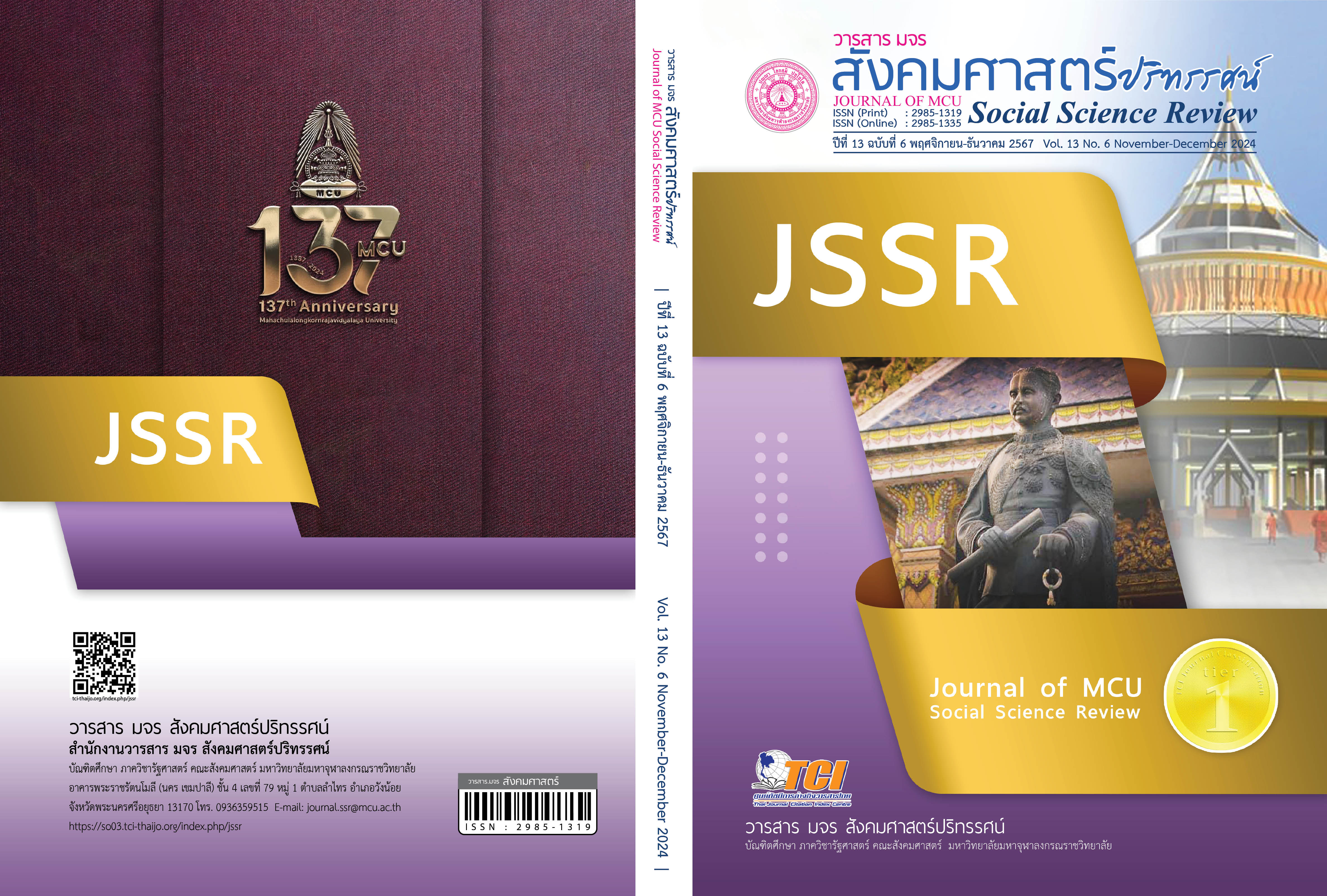การประยุกต์หลักพุทธธรรมเพื่อการบริหารความเสี่ยงในการซื้อข้าวเปลือกจากเกษตรกรของผู้ประกอบการโรงสีข้าวในจังหวัดนครสวรรค์
คำสำคัญ:
การบริหารความเสี่ยง, การซื้อข้าวเปลือก, ผู้ประกอบการโรงสีข้าวบทคัดย่อ
บทความวิจัยนี้มีวัตถุประสงค์ 1. ศึกษาการบริหารความเสี่ยงในการซื้อข้าวเปลือกจากเกษตรกร 2. ปัจจัยที่ส่งผลต่อการบริหารความเสี่ยงในการซื้อข้าวเปลือกจากเกษตรกร 3. การประยุกต์หลักพุทธธรรมเพื่อการบริหารความเสี่ยงในการซื้อข้าวเปลือกจากเกษตรกรของผู้ประกอบการโรงสีข้าวในจังหวัดนครสวรรค์ พบว่า การบริหารความเสี่ยงในการซื้อข้าวเปลือกจากเกษตรกรของผู้ประกอบการโรงสีข้าวในจังหวัดนครสวรรค์ ดำเนินการวิธีวิจัยแบบผสานวิธี เก็บข้อมูลกับกลุ่มตัวอย่าง จำนวน 273 คน และสัมภาษณ์ผู้ให้ข้อมูลสำคัญ 18 รูปหรือคน เครื่องมือในการวิจัยเป็นแบบสอบถามและแบบสัมภาษณ์ ใช้การวิเคราะห์ข้อมูลทั้งเชิงพรรณนาและเชิงอนุมาน
ผลการวิจัยพบว่า 1. การบริหารความเสี่ยงในการซื้อข้าวเปลือกจากเกษตรกร ภาพรวมอยู่ในระดับมาก 2. ปัจจัยที่ส่งผลต่อการบริหารความเสี่ยงในการซื้อข้าวเปลือกจากเกษตรกร พบว่า 1. กระบวนการบริหาร ประกอบด้วย วัสดุสิ่งของ เงิน และคน 2. หลักอปริหานิยธรรม ประกอบด้วย หมั่นประชุมกันเนืองนิตย์ การไม่ตั้งกฎระเบียบตามที่ขัดต่อระเบียบเดิม ให้การดูแลเอาใจใส่แก่ลูกค้า พร้อมเพรียงกันประชุม การความเคารพและรับฟังความคิดเห็นของผู้ใหญ่ ส่งผลต่อปัจจัยที่การบริหารความเสี่ยงในการซื้อข้าวเปลือกจากเกษตรกร อย่างมีนัยสำคัญทางสถิติที่ระดับ 0.05 3. การประยุกต์หลักพุทธธรรมเพื่อการบริหารความเสี่ยงในการซื้อข้าวเปลือกจากเกษตรกร พบว่า มีการนำหลักอปริหานิยธรรม 7 มาเป็นหลักธรรมนำสู่การบริหารความเสี่ยงในการซื้อข้าวเปลือกจากเกษตรกร นอกจากนั้นยังนำการบริหารจัดการมาเป็นพื้นฐานผสานกับหลักธรรมนำสู่การบริหารความเสี่ยงในการซื้อข้าวเปลือกจากเกษตรกรของผู้ประกอบการโรงสีข้าวในจังหวัดนครสวรรค์ทั้งด้านบุคคล ด้านเงินทุน ด้านวัสดุสิ่งของ และด้านการจัดการ ด้วย
เอกสารอ้างอิง
ทักษิณ ประชามอญ. (2561). รูปแบบการบริหารงานแบบมีส่วนร่วมตามหลักพุทธธรรมขององค์การบริหารส่วนจังหวัดในกลุ่มจังหวัดภาคตะวันออกเฉียงเหนือตอนบน (ดุษฎีนิพนธ์พุทธศาสตรดุษฎีบัณฑิต สาขาวิชารัฐประศาสนศาสตร์), พระนครศรีอยุธยา: มหาวิทยาลัยมหาจุฬาลงกรณราชวิทยาลัย.
ทัศนีย์ ปิยะเจริญเดช. (2564). รูปแบบการพัฒนาการจัดการการท่องเที่ยวบนพื้นที่เศรษฐกิจพิเศษในจังหวัดสงขลา (ดุษฎีนิพนธ์ปรัชญาดุษฎีบัณฑิต สาขาวิชารัฐประศานศาสตร์). พระนครศรีอยุธยา: มหาวิทยาลัยมหาจุฬาลงกรณราชวิทยาลัย.
ประวัติ ยงบุตร และคณะ. (2557). การพัฒนารูปแบบการบริหารความเสี่ยงทั่วทั้งองค์กรในสำนักงานเขตพื้นที่การศึกษาประถมศึกษา. วารสารศึกษาศาสตร์มหาวิทยาลัยนเรศวร, 16(1), 78-86.
พัชร์ศศิ เรืองมณีญาต์. (2566). การพัฒนาการจัดการท่องเที่ยวในเขตพัฒนาพิเศษภาคตะวันออกโดยการประยุกต์ตามหลักคำสอนทางพระพุทธศาสนา (ดุษฎีนิพนธ์ปรัชญาดุษฎีบัณฑิต สาขาวิชารัฐประศาสนศาสตร์). พระนครศรีอยุธยา: มหาวิทยาลัยมหาจุฬาลงกรณราชวิทยาลัย.
มหาวิทยาลัยมหาจุฬาลงกรณราชวิทยาลัย. (2539). พระไตรปิฎกฉบับภาษาไทย ฉบับมหาจุฬาลงกรณราชวิทยาลัย. กรุงเทพฯ: โรงพิมพ์มหาจุฬาลงกรณราชวิทยาลัย.
สำนักงานจังหวัดนครสวรรค์. (2567). เกษตรกรรม. สืบค้น 30 มกราคม 2567, จาก https://shorturl.asia/sIN1W
อภิวัฒน์ จ่าตา. (2564). การบริหารจัดการของรัฐในการส่งเสริมกัญชาเสรีเพื่อการแพทย์ทางเลือกของไทย (ดุษฎีนิพนธ์ปรัชญาดุษฎีบัณฑิต สาขาวิชารัฐประศาสนศาสตร์). พระนครศรีอยุธยา: มหาวิทยาลัยมหาจุฬาลงกรณราชวิทยาลัย.
The Active Thai PBS. (2024). Why is Thai rice priceless? Farmers don't make a profit?. Retrieved January 20, 2024, from https://theactive.net/data/thai-farmers-and-thai-rice-industry/
Yamane, T. (1973). Statistic: An Introductory Analysis (3rd ed.). New York: Harper and Row.
ดาวน์โหลด
เผยแพร่แล้ว
รูปแบบการอ้างอิง
ฉบับ
ประเภทบทความ
สัญญาอนุญาต
ลิขสิทธิ์ (c) 2024 วารสาร มจร สังคมศาสตร์ปริทรรศน์

อนุญาตภายใต้เงื่อนไข Creative Commons Attribution-NonCommercial-NoDerivatives 4.0 International License.
เพื่อให้เป็นไปตามกฎหมายลิขสิทธิ์ ผู้นิพนธ์ทุกท่านต้องลงลายมือชื่อในแบบฟอร์มใบมอบลิขสิทธิ์บทความให้แก่วารสารฯ พร้อมกับบทความต้นฉบับที่ได้แก้ไขครั้งสุดท้าย นอกจากนี้ ผู้นิพนธ์ทุกท่านต้องยืนยันว่าบทความต้นฉบับที่ส่งมาตีพิมพ์นั้น ได้ส่งมาตีพิมพ์เฉพาะในวารสาร มจร สังคมศาสตร์ปริทรรศน์ เพียงแห่งเดียวเท่านั้น หากมีการใช้ภาพหรือตารางหรือเนื้อหาอื่นๆ ของผู้นิพนธ์อื่นที่ปรากฏในสิ่งตีพิมพ์อื่นมาแล้ว ผู้นิพนธ์ต้องขออนุญาตเจ้าของลิขสิทธิ์ก่อน พร้อมทั้งแสดงหนังสือที่ได้รับการยินยอมต่อบรรณาธิการ ก่อนที่บทความจะได้รับการตีพิมพ์ หากไม่เป็นไปตามข้อกำหนดเบื้องต้น ทางวารสารจะถอดบทความของท่านออกโดยไม่มีข้อยกเว้นใดๆ ทั้งสิ้น





